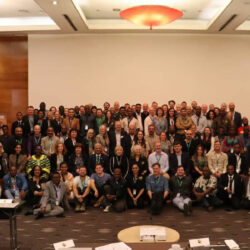The Cheetah Conservation Fund Receives Grant from Finland’s Fund for Local Cooperation to Improve Livelihoods in the Greater Waterberg Landscape
-

- by CCF Staff June 11, 2013
FOR IMMEDIATE RELEASE
Contact:
CCF: Dr. Bruce Brewer (ph: 067 – 306225, cell: 081-1247799)
FLC: Marika Matengu (ph: 061-221 355)
The Cheetah Conservation Fund Receives Grant from Finland’s Fund for Local Cooperation to Improve Livelihoods in the Greater Waterberg Landscape
[Otjiwarongo, Namibia – 11 June 2013] – Cheetah Conservation Fund (CCF) is pleased to announce that it is one of three recipients of a funding agreement with the Embassy of Finland. The agreements were signed on 11 June 2013, and announced by the Head of Mission of the Embassy of Finland, Ms. Anne Saloranta. The grants are part of the Fund for Local Cooperation (FLC) of the Embassy of Finland. The total funding amount is 4 500 000 NAD (359 570 Euros). The Fund supports the eradication of poverty as well as economically, socially and ecologically sustainable development of Namibia in line with the goals of NPD4. Other recipients of funding were the Civil Society Foundation of Namibia (CSFN) and Namibia Art, Craft and Design.
The grant support from the FLC will assist CCF to improve the livelihoods of inhabitants of the Greater Waterberg Landscape (GWL), by creating a de-bushing enterprise. While bush encroachment is a serious problem for both livestock and wildlife in this region, it can be harvested and used to produce other products. Harvesting bush provides the opportunity to increase the amount of grazing land while producing a resource that can be sold, and also restore the natural habitat for wildlife. This involves assisting the inhabitants in business development and organisation, and providing a sustainable source of income through purchase of the harvested bush.
The Greater Waterberg Landscape (GWL) is comprised of several conservancies and commercial farms that fall within the Okakarara constituency. The GWL covers over 18,700km2 and is home to approximately 25,000 people. The Cheetah Conservation Fund (CCF) has worked with these neighbours since 1991 to conserve the cheetah in the wild. CCF is committed to assisting and implementing developmental projects that will benefit the community, satisfy the needs of the people and assist in the progression of the region.
CCF recently completed a needs assessment survey for the area as a project of the Namibia Protected Landscape Conservation Areas Initiative (NAMPLACE), a UNDP/GEF five-year development initiative. Ninety-nine percent of survey respondents cited livestock as their primary income generating activity. Yet due to several factors, bush has inundated the veld in the GWL, and is intensifying livestock overgrazing by reducing the amount of available grazing lands. It is also contributing to the displacement of wildlife that once flourished in the area. Bush encroachment is the largest problem with the veld according to interviewees. When asked how the veld could be improved, half of the respondents cited de-bushing as the best solution.
CCF will assist the GWL in organising the de-bushing enterprise. This will include training and assistance in small business enterprise development, training in appropriate de-bushing techniques, and arts and crafts production training sessions utilising a portion of the harvested bush. CCF will assure via contract that the GWL de-bushing is done in a sustainable fashion and in compliance with all Namibian regulations, and that workers have access to appropriate personal protective equipment and training in its use. When harvest is accomplished under established guidelines, CCF will purchase the bush at market price, reduce it to woodchip, and transport it to Otjiwarongo for production of Bushblok.
In addition to the direct impact of this harvest, the success of the project will confirm that the GWL de-bushing activity could become a reliable supplier of bush to other ventures as the Namibian biomass industry develops.
Editor’s notes:
About Cheetah Conservation Fund (CCF):
The Cheetah Conservation Fund (CCF) is a Namibian non-profit trust dedicated to the long-term survival of the cheetah and its ecosystems.
Since 1990, the organisation has developed education and conservation programmes based on its bio-medical cheetah research studies, published over 60 scientific research papers and has presented educational programmes to more than 300,000 outreach school learners, donated over 400 livestock guarding dogs to commercial and communal farmers as part of the CCF innovative non-lethal livestock management programme, and has established a cheetah genome resource bank of cheetah sperm, tissue and blood samples.
Research into cheetah biology and ecology has greatly increased our understanding of the fastest land animal and education programmes for schools and the farming community help change public attitudes to allow predator and humans to co-exist. However, despite the many successes of CCF programmes, the cheetah is still Africa’s most endangered big cat with ~10,000 cheetahs remaining.
For more information:
Cheetah Conservation Fund
PO Box 1755, Otjiwarongo – Namibia
Tel: (067) 306225
Fax: (067) 306247
E-mail: cheetah@iway.na
Website: https://www.cheetah.org
About Fund for Local Cooperation (FLC):
The Fund for Local Cooperation (FLC) is a local funding instrument administered by the Embassy. It has supported the work towards the promotion and realization of human rights and democracy in Namibia for nearly 11 years, complementing other funding instruments made available by the Government of Finland. The Fund for Local Cooperation is used to support various development initiatives and civil society actors. It is also used to promote trade and business relations between Finland and Namibia. The linkages between Finland and Namibia date back 140 years to the time of the arrival of first missionaries to the North of Namibia. The relationship between the two countries is warm. Finland is a committed development partner to Namibia especially in the fields of human rights and democracy, ecologically sustainable development, economic and social development and cultural heritage and protection.
For more information:
Embassy of Finland
2 Crohn Street (Corner of Bahnhof Street)
Windhoek, Namibia
Tel.+264-61-221 355
E-mail: sanomat.win@formin.fi
https://finlandabroad.fi/web/nam/frontpage
Related Reading


